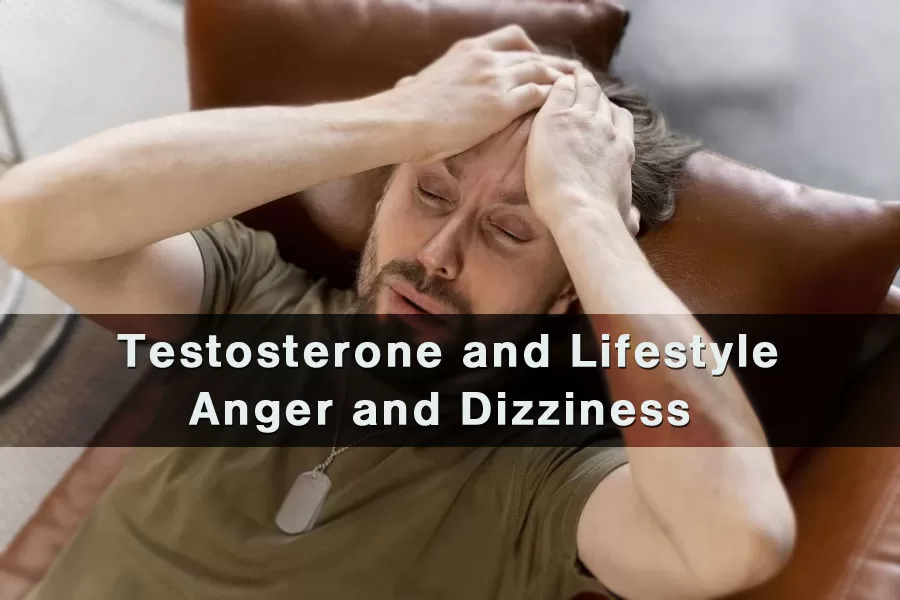
When we consider the vast expanse of the human body’s complexities, it’s remarkable how a single substance can play such a pivotal role in shaping our experiences and well-being. Testosterone, often typecast in the narrative of human biology as a mere contributor to male characteristics, emerges as a protagonist in a much broader story. Testosterone, silently flowing through our veins, is a subtle but powerful force that influences everything from our physical strength to the ebb and flow of our emotions and lifestyle.
What is Testosterone?
Testosterone might sound like a fancy medical term, but it’s actually a pretty straightforward hormone that plays some key roles in our bodies.
The Basics of Testosterone
- A Hormone with Many Roles: Testosterone is often tagged as the “male hormone,” but it’s not just for guys. It’s crucial in male development, sure, but it does a lot for everyone. Think of it as a chemical in your body that sends important signals to different parts.
- Not Just for Men: Yes, men have more of it, and it’s a big deal during puberty when boys start developing manly features. But women have testosterone too, and it plays its part in their bodies, albeit in a less flashy way.
What Testosterone Does
- Teenage Changes: For teenage boys, testosterone is like the director of a movie about becoming a man. This is associated with a deeper voice, facial and body hair, and other changes. For girls, it is more of a secondary concern, helping to strengthen bones and perhaps even affect mood.
- Muscles and Bones: Whether you exercise or not, this hormone will help you with that. This is the key to building and maintaining muscle, as well as strong bones. This isn’t just gym talk; it’s about staying fit and healthy.
- Mood and Energy: It’s not all physical. Testosterone can play with your emotions and energy levels. When there is too much or too little testosterone, it can make you feel like you’re on an emotional roller coaster or just completely run out of steam.
- Adult Life: After the teenage years, testosterone doesn’t clock out. It keeps working, helping maintain muscle mass, control body fat, and playing a role in sexual health and fertility.
- Overall Well-Being: Testosterone impacts how energetic you feel, the quality of your sleep, and might even influence your risk for certain diseases.
Testosterone Levels and Life Stages
- Age Factor: As men get older, their testosterone levels often decrease. This can change how they feel physically and mentally.
- Health Conditions: Some diseases affect the level of this hormone. Hormonal imbalances, obesity, diabetes, and even stress can throw things off track.
- Lifestyle Choices: The way you live plays a big part. Your diet, exercise habits, stress levels, and sleep patterns can all bump your testosterone levels up or down.
Testosterone and Mood
Not Just an Anger Trigger: The common belief that testosterone only ramps up aggression is an oversimplification. This hormone actually plays a diverse role in our emotional world.
High Levels and Their Effects: In some, especially men, a spike in testosterone might lead to quicker tempers or a feeling of restlessness. But this isn’t a universal rule.
Low Levels and the Blues: When levels of this hormone drop, it can sometimes lead to feelings of sadness. This is often noticed in older men as their natural testosterone levels decline as they age.
Women’s Emotional Landscape: Yes, women have testosterone too, and it plays its part quietly in the background. Fluctuations in this hormone can subtly influence their mood swings, especially during hormonal shifts like the menstrual cycle or menopause.
Beyond the Stereotypes
- A Jolt of Energy or Lack Thereof: Testosterone can be a factor in how pumped up or drained you feel. Imagine it as an invisible force that can either fuel your energy tank or leave it running on empty.
- Self-Confidence and Testosterone: There’s a possibility that testosterone levels might nudge your self-confidence meter.
- Focus and Memory: t is believed that this hormone helps keep the brain in great shape. If the balance is off, you may find yourself more forgetful or frivolous.
The Individual Twist
Remember, how testosterone affects mood is super personal. Your body, your lifestyle, and even your mindset play into how this hormone influences you.
Balancing Act
Finding the right testosterone balance is key to emotional well-being. If you’re feeling unusually up and down or just not like yourself, it might be worth checking if testosterone levels are part of the picture.
Testosterone and Dizziness
- Testosterone and Blood Pressure Dynamics: This hormone plays a role in blood pressure management and an imbalance of this hormone can lead to blood pressure disorders. These irregularities can cause dizziness, similar to the feeling of disorientation that can be felt with sudden changes in altitude.
- Energy Fluctuations Linked to Testosterone: The body’s energy management is partly influenced by hormones. If a significant shift in testosterone levels occurs, it can lead to sudden changes in energy, which may manifest as a fleeting feeling of weakness or dizziness, similar to the dizziness that can occur after standing up quickly.
- Inner Ear Balance and Testosterone: Some research points to the possibility that the hormone affects the inner ear, a key component of maintaining physical balance. An imbalance in hormone levels can potentially affect the function of the inner ear, leading to feelings of dizziness or instability.
Broader Perspectives on Dizziness and Testosterone
It’s important to understand that the connection between testosterone and dizziness is just one aspect of a complex picture:
- Aging and Hormonal Changes: As individuals age, there’s a natural decline in testosterone levels, often coinciding with more frequent dizziness. However, aging also brings other physiological changes that could contribute to dizziness.
- Lifestyle Impacts on Testosterone and Dizziness: Daily lifestyle choices, including diet and exercise habits, not only influence testosterone levels but can also directly affect instances of dizziness.
- Other Health Conditions: A range of health conditions unrelated to testosterone can lead to dizziness. Therefore, frequent dizziness should be evaluated within the broader context of overall health.
Physical Health and Testosterone
Testosterone’s Role Beyond the Gym
Muscle Matters: Sure, testosterone helps in building muscles, but it’s not just for show. It’s about making sure your muscles work well for all the stuff you do every day.
Bones: Think of testosterone as a silent partner for your bones, keeping them strong and less likely to snap as you age.
Heart and Blood: The Inside Story
Heart Health: This hormone is involved in a complex dance with your heart. It’s like a balancing act: too much or too little can throw things off balance.
Blood Flow and Cholesterol: It helps maintain smooth blood flow and control the amount of fat in the blood.
Weight Control: More Than Diet and Exercise
Fat Storage: Your body decides where to store fat based in part on your testosterone levels. Less hormone may mean more fat around the belly.
Metabolic Mojo: The hormone keeps your metabolism in tune, helping your body use energy efficiently and stay in shape.
Skin and Hair: The Visible Effects
Skin Health: Testosterone can influence your skin’s thickness and stretchiness. It’s quietly playing a part in how your skin looks and feels.
Hair Tales: It’s the reason some guys can grow beards. But, paradoxically, it can also be why some men lose hair on their heads.
Sleep: The Nighttime Connection
Sleep Patterns: Your testosterone levels might be messing with how well you sleep. If they’re out of whack, good sleep might be hard to come by.
Healing and Recovery: The Body’s Repair Kit
Injury Recovery: There’s chatter about testosterone helping with healing wounds, but this is still a bit of a mystery and needs more research.
Aging and Testosterone
As you get older, your testosterone levels typically drop. This change can affect a lot – from your muscle tone to your mood. Keeping an eye on these levels is part of staying healthy as you age.
Lifestyle Influences
Delving into how daily life impacts testosterone, it becomes clear that our routine actions and choices are quietly sculpting the levels of this hormone. The interplay between what we do, eat, and how we unwind forms a dynamic backdrop for hormonal health.
Nutrition, for starters, isn’t just about avoiding junk food or counting calories. It’s a more nuanced affair where the types of nutrients we consume play a starring role. Foods that are friends with testosterone, like those rich in zinc and vitamin D, do more than just satisfy hunger; they’re like little helpers keeping hormone levels in check. The kind of fats we eat also matters. Swapping out greasy, processed options for wholesome fats like those in avocados and nuts is like giving your hormones a better environment to thrive in.
Then there’s the exercise factor. It’s not just about sweating it out occasionally. Regularity in physical activity, particularly types that challenge your muscles like weight lifting, sends positive signals to your testosterone. But it’s a delicate dance – pushing too hard without rest days can send the wrong signal, dialing down testosterone instead of up.
The story of stress and testosterone is a compelling one. It’s like they’re on a swing; when stress (and therefore cortisol levels) increase, levels of the hormone often drop. Finding personal oases of calm through meditation, hobbies, or simply relaxation can help rebalance this balance. In addition, the companion of stress – sleep disturbance – can also affect its production. A consistent sleep schedule isn’t just good for feeling rested; it’s like adjusting your hormones at night.
Lifestyle elements like alcohol and smoking carry their own weight in this hormonal equation. Moderation with alcohol and steering clear of smoking aren’t just general health advice; they’re specific tools for keeping testosterone levels from going off-kilter.
And as the years roll on, these lifestyle choices take on new dimensions. Adapting your habits to align with the natural shift in testosterone as you age can be a strategic move for long-term health.
In essence, the daily script of our lives – from the breakfast we choose to the way we unwind at night – plays a continuous, dynamic role in the story of our testosterone levels. Each choice is like a scene in this story, contributing to the overall narrative of our hormonal health. By crafting these scenes with mindfulness and an eye towards balance, we can direct a healthier, more harmonious hormonal journey.
Testosterone in Aging
Talking about testosterone as we get older, it’s like watching a slow sunset – it gradually goes down over the years. This isn’t just about getting a bit older; it’s a change that touches various parts of life.
For guys, this change usually kicks in around their 30s. By the time they hit their 60s or 70s, their testosterone levels are quite a bit lower than when they were younger. This doesn’t happen overnight but creeps up quietly over time.
So, what does this mean in everyday life? For starters, keeping muscle becomes a bit harder. That gym routine might not yield the same results as it used to. Also, bones can get a bit more fragile with lower testosterone, upping the risk of breaks or osteoporosis.
In the bedroom, things might change too. Lower testosterone can affect things like sexual drive and performance. But it’s important to remember that these changes aren’t just about hormones. Other health stuff and even emotions play into this as well.
Beyond the physical stuff, there’s the impact on energy and moods. Some guys might find they’re not as peppy as before, or their moods might swing more. It’s easy to shrug this off as just a part of aging, but sometimes it’s linked to these hormonal changes.
Women go through their own thing with testosterone, especially during menopause. While the spotlight’s often on estrogen during this time, the drop in testosterone also matters. It can mean shifts in energy, mood, and even sexual interest.
It’s key to not get too hung up on these changes or jump to the conclusion that they need fixing. Sure, they’re part of getting older, but they don’t always need medical treatment. Sometimes, tweaking how you eat and exercise can help. And in some cases, doctors might suggest hormone treatments, but that’s something to approach carefully and with professional advice, because it’s not without risks.
Managing Testosterone Levels
First up, everyone’s ‘right level’ is different. So, the goal isn’t a universal number; it’s what makes you feel good and healthy.
Food is a big deal here. Eating right isn’t just about avoiding junk. It’s about adding stuff that’s good for your hormones, like veggies, fish, and nuts. It’s like picking ingredients that turn up the good vibes for your body.
Exercise is another key. Regular exercise, especially one that gets your muscles working, can help keep your testosterone levels healthy. But if you overdo it, it can really ruin everything. The trick is to keep it steady and balanced.
Then there’s the whole stress thing. Finding ways to relax, whether it’s a hobby, hanging out with friends, or just relaxing, will help you maintain harmony.
Sleep is super important, too. Think of it as your body’s nightly reset button. Bad sleep can mess with your hormone levels, so getting enough of it is key.
Now, for some folks, especially as they get older, lifestyle changes might not be enough. That’s where talking to a doctor about medical options like hormone therapy comes in. It’s not something to jump into without thinking. It’s a serious decision and needs careful consideration with a doctor.
So, managing your testosterone is about looking at your whole life – how you eat, how you move, how you relax, and how you sleep. For some, there might be a need for medical help. It’s all about finding what mix works best for you, keeping your body’s rhythm just right.
Conclusion
The link between testosterone and lifestyle is more significant than many realize. It’s not just about bodybuilding or male traits; it’s about how this hormone, influenced by our daily habits, affects our mood and physical sensations like anger and dizziness. By focusing on a balanced lifestyle, with proper diet, exercise, stress management, and good sleep, we can better control our testosterone levels, which in turn can improve our emotional stability and physical well-being.
FAQs
Yes, it does. Eating foods rich in essential nutrients can help maintain healthy testosterone levels. For example, zinc and vitamin D are great for this.
Definitely. Regular physical activities, particularly strength training, can boost your testosterone. Just remember not to overdo it, as too much exercise without rest can lower your testosterone levels.
Stress increases cortisol, a hormone that can lower testosterone. Managing stress through relaxing activities can help keep your testosterone levels balanced.
Yes, testosterone can influence your mood. Both high and low levels of testosterone can lead to mood swings and feelings of anger.
Testosterone imbalances can affect your blood pressure and circulation, which might cause dizziness. If you’re often dizzy, it’s a good idea to see a doctor to find out the exact cause.
Yes. Eating a balanced diet, staying active, reducing stress, and getting good sleep can naturally help you manage your testosterone levels. However, if you have specific health concerns, it’s best to talk to a doctor.







